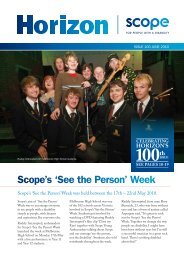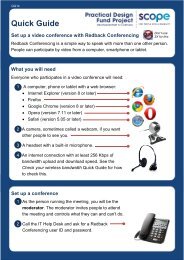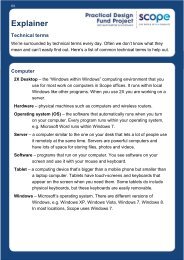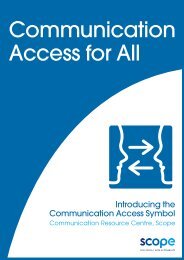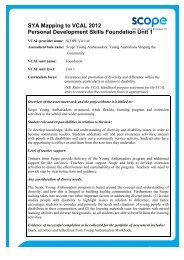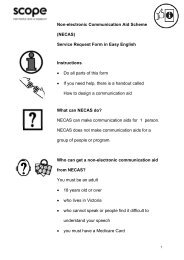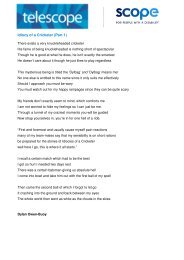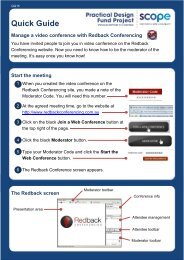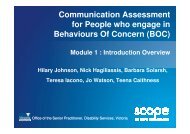Positive behaviour support Getting it right from the start
Positive behaviour support Getting it right from the start
Positive behaviour support Getting it right from the start
Create successful ePaper yourself
Turn your PDF publications into a flip-book with our unique Google optimized e-Paper software.
102 <strong>Pos<strong>it</strong>ive</strong> <strong>behaviour</strong> <strong>support</strong>: <strong>Getting</strong> <strong>it</strong> <strong>right</strong> <strong>from</strong> <strong>the</strong> <strong>start</strong> - Facil<strong>it</strong>ators reference manual<br />
Appendix 3: Overview — Person Centred Active Support<br />
PCAS is now <strong>the</strong> required approach to service delivery in Disabil<strong>it</strong>y Accommodation Services<br />
(DAS). The department has embraced PCAS in order to increase <strong>the</strong> participation of people w<strong>it</strong>h<br />
a disabil<strong>it</strong>y in everyday tasks and activ<strong>it</strong>ies and tackle associated issues such as:<br />
• Problems w<strong>it</strong>h under-activ<strong>it</strong>y<br />
• Behavioural issues<br />
• Physical health problems<br />
• Depression.<br />
The role of staff is to constantly look for opportun<strong>it</strong>ies to involve people in <strong>the</strong> things happening<br />
around <strong>the</strong>m, so <strong>the</strong>y gain more control over <strong>the</strong>ir lives, become more included in <strong>the</strong>ir<br />
commun<strong>it</strong>y, pursue <strong>the</strong>ir own interests and gain independence.<br />
The Person Centred Active Support (PCAS) approach is about:<br />
• Increasing <strong>the</strong> levels of everyday engagement and interactions between staff and people w<strong>it</strong>h<br />
disabil<strong>it</strong>ies living in group homes and documenting this via a planning process which records<br />
and mon<strong>it</strong>ors activ<strong>it</strong>ies, allocates staff time to ensure activ<strong>it</strong>ies occur, and regularly reviews a<br />
person’s progress.<br />
• Ensuring people w<strong>it</strong>h a disabil<strong>it</strong>y enjoy spending time participating in different activ<strong>it</strong>ies.<br />
• Challenging disengagement which sometimes happens to people w<strong>it</strong>h a disabil<strong>it</strong>y where staff<br />
do most things for <strong>the</strong>m and <strong>the</strong>y become non-participating spectators in <strong>the</strong>ir own lives,<br />
resulting in a loss of skills, confidence and motivation.<br />
The approach provides a model in which staff map participation in activ<strong>it</strong>ies w<strong>it</strong>hin group<br />
homes and <strong>the</strong> local commun<strong>it</strong>y, ensuring <strong>the</strong> <strong>support</strong> people require is planned, provided<br />
and regularly reviewed.<br />
The approach includes <strong>the</strong> following components:<br />
• Staff proactively planning opportun<strong>it</strong>ies for and w<strong>it</strong>h people.<br />
• Staff documenting <strong>the</strong> activ<strong>it</strong>ies to be pursued, <strong>the</strong>ir responsibil<strong>it</strong>ies and allocating time to<br />
<strong>support</strong> activ<strong>it</strong>ies.<br />
• Staff <strong>support</strong>ing participation (where required) by supplementing verbal instruction w<strong>it</strong>h<br />
gestures or physical prompts, demonstrating how to undertake <strong>the</strong> tasks or activ<strong>it</strong>y, providing<br />
physical guidance, etc.<br />
• Staff regularly mon<strong>it</strong>oring and reviewing <strong>the</strong> opportun<strong>it</strong>ies provided.<br />
PCAS is based on a premise that all of us enjoy spending time participating in different activ<strong>it</strong>ies.<br />
Generally, we do not like doing l<strong>it</strong>tle or nothing for most of <strong>the</strong> time.<br />
The amount of time spent participating in social, personal, household, leisure or o<strong>the</strong>r pursu<strong>it</strong>s<br />
typical of everyday living, as opposed to having l<strong>it</strong>tle to do, being passive or engaged in aimless<br />
activ<strong>it</strong>y, is a measure of qual<strong>it</strong>y of life.<br />
PCAS is not concerned w<strong>it</strong>h forcing or coercing people to undertake chores or household tasks<br />
<strong>the</strong>y do not want to be involved w<strong>it</strong>h, but involves ga<strong>the</strong>ring information about <strong>the</strong> activ<strong>it</strong>ies <strong>the</strong>y<br />
wish to pursue (at home and in <strong>the</strong> local commun<strong>it</strong>y), and having in place a structured way to<br />
ensure engagement w<strong>it</strong>h such activ<strong>it</strong>ies occurs.



